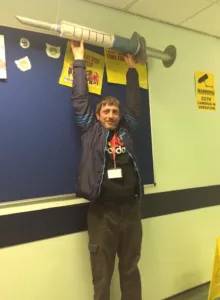‘Without his courage and tenacity, the process of support would not have worked’.
Published: by Guest blog

Lee Demetriou on his experiences of working with Lead Worker/Peer Mentor client, *Sam.
The Lead Worker/Peer Mentor Service was a workstream within Birmingham Changing Futures Together, a partnership between Shelter, Birmingham Mind and SIFA Fireside.
I have written so many case notes concerning Sam, it now feels strange to put a more personal touch to his story.
My first encounters with Sam were at the Shelter office, where he would present as heavily intoxicated, always with a cheeky smile and a joke to share. All too often, he would display new injuries such as cuts and broken bones, and he would tell me he had had an altercation with someone, or punched a wall or a door. I never witnessed any of this anger, and he always seemed happy, yet very anxious.
Sam was living in the multiple needs unit In Birmingham, and I would visit him there with his Lead Worker, who had been supporting him for nearly a year. He was referred to the Lead Worker/Peer Mentor Service following an arrest for assault, where he received an injunction banning him from his address – making him homeless and causing an increase in his alcohol dependence. In desperation, Sam had presented at A&E seven times in two weeks for mental health support. On one visit, he tried to hang himself on the ward. Services were at a loss as to how to support him.
‘I allowed him to see that I too had had difficult times in my life’
I started to talk to Sam on a level we were both familiar with. Although remaining professional, I allowed him to see that I too had had difficult times in my life, and showed him that there was a way out of this. He would tell me how his father was in the IRA and how his Mum fled Northern Ireland with him and his siblings. His mother would often be in abusive relationships, so he ended up going to live with his grandmother (lovingly called ‘The Old Goose’).
Sam was bullied at school, which culminated in him being thrown into the canal, being pushed back into the water every time he tried to get out, and nearly drowning. Sam started to develop social phobia and then refused to attend school. At age 16, he married someone who lived two doors down from him as he was too scared to go outside, and spent the duration of their marriage indoors. At one point, Sam didn’t leave the house for five years, and could only go out after drinking alcohol – which increased his confidence, but unfortunately led to dependence and the end of his marriage. He always talked about his breakdown in relationships and how he missed his children. I helped him to see this was probably a pattern from his own childhood.
A change in perspective
Sam continued to drink, on occasion using crack cocaine, and continued to get into fights. I understood that this was a defence mechanism relating to his past trauma, but still was not helpful for his recovery. I pointed out to him that he was once on the receiving end of beatings, and asked him how that made him feel. This allowed him to see a different perspective of his behaviour, and that to defend himself is different from praying on other vulnerable people. He agreed with this perspective after I had pointed this out to him, and the focus of our discussions had changed.
Sam was starting to understand that his alcoholism was used to avoid the feelings of his past traumas, and this allowed me an opportunity to inform him of the detox and rehab facilities that were available to him. He was understandably sceptical. On my next meeting with him, a doctor’s appointment, I asked the doctor to explain the potential physical consequences if he continued at his current rate of alcohol consumption. I remember the look on his face like it was yesterday, and could see that he understood the severity of his drinking. He had allowed himself this opportunity by taking on the suggestions of attempting to reduce his drinking, especially when attending appointments.

Sam agreed to engage with substance misuse services, and myself and the Lead Worker would attend the appointments with him, including the doctor for his initial assessment. We also supported him to mutual aid groups that were readying him to go into treatment. He worked very hard, despite the odd bottle of vodka in the toilet, and I cannot recall him missing any appointments. He would often ask before attending the groups if I minded him having a can beforehand. I reminded him he made his own decisions and I was not there to judge him. The fact is, I felt privileged that he asked my permission, because I knew that this meant he had listened to me.
‘He excelled in this environment’
After around three months Sam was offered a place in detox which he completed successfully and went on to a rehabilitation centre. He excelled in this environment, and when visiting him the discussions were around his achievements such as being nominated resident of the week and his aspirations for the future. Sam engaged well with his Community Mental Health Team while in rehab and had been referred for psychological therapy to address previous trauma.
Sam now maintains his own property, and engages with a company called the Geese Theatre, using acting to overcome his social phobia and anxiety. I have actually seen him in one of their productions and he was brimming with confidence, the stand-out star of the show. He has been into the office on several occasions since our support with him ended, and now he tells me about young ladies he has seen, family Christmas dinners he has attended, and the regular contact with his children. Sam is especially proud of rebuilding a relationship with his Uncle, who he had once beaten up when he was drunk. He had nothing but praise for his Lead Worker and me. I took the opportunity to remind him that without his courage and tenacity, the process of support would not have worked.
*Name has been changed
For further details about the Lead Worker/Peer Mentor Continuation Strategy, please contact Christine Grover, Team Leader. Email: Christine_Grover@shelter.org.uk; tel: 07795391202.
You might also be interested in Joe’s story – another one of our clients, who we supported as part of our Lead Worker/Peer Mentor programme.

Find out more about Birmingham Changing Futures Together service in partnership with Shelter, Birmingham Mind and Sifa Fireside.